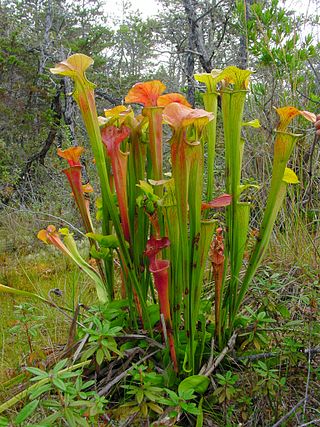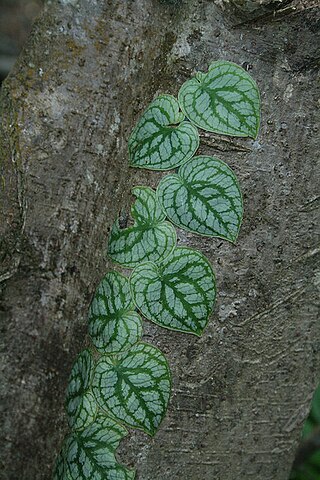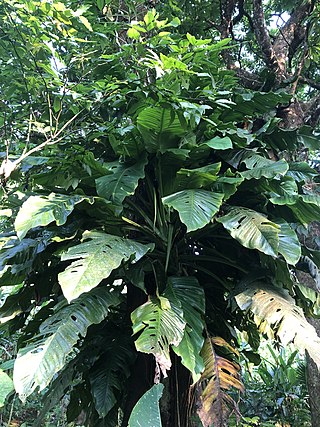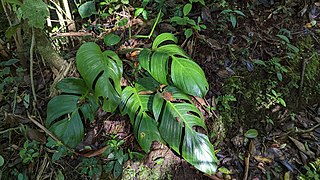
Monstera deliciosa, the Swiss cheese plant or split-leaf philodendron is a species of flowering plant native to tropical forests of southern Mexico, south to Panama. It has been introduced to many tropical areas, and has become a mildly invasive species in Hawaii, Seychelles, Ascension Island and the Society Islands. It is very widely grown in temperate zones as a houseplant.

Monstera is a genus of 59 species of flowering plants in the arum family, Araceae, native to tropical regions of the Americas.

Sarracenia oreophila, also known as the green pitcherplant, is a carnivorous plant in the genus Sarracenia. It has highly modified leaves in the form of pitchers that act as pitfall traps for prey. The narrow pitcher leaves are tapered tubes that rise up to 75 centimetres (30 in) from the ground, with a mouth 6 to 10 centimetres in circumference Like all the Sarracenia, it is native to North America. Sarracenia oreophila is the most endangered of all Sarracenia species, its range limited to a handful of sites in northern Alabama, North Carolina, Georgia, and—historically—Tennessee.

Monstera adansonii, the Adanson's monstera, Swiss cheese plant, or five holes plant, is a species of flowering plant from family Araceae which is widespread across much of South America and Central America. Besides South American countries it can also be found in the West Indies on islands such as Antigua, Grenada, Saba, St. Kitts, Guadeloupe, Marie Galante, Dominica, Martinique, St. Lucia, St. Vincent, Tobago, and Trinidad. The species is quite common near river valleys at lower elevations.

Monstera dubia is a species of plant in the genus Monstera native to Central and South America. M. dubia is known for the dramatic transformation its foliage makes as it climbs from seed stage on the forest floor, to shingling closely up a host tree trunk or other surface, until mature leaves with fenestrations similar to Monstera deliciosa appear. This transformation is an example of leaf dimorphism. Dubia refers to dubious, because authors were not certain that the species fell within the genus Marcgravia, where it was initially placed.
Monstera tacanaensis is a species of flowering plant in the genus Monstera of the arum family, Araceae.
Monstera amargalensis is a flowering plant that belongs to the genus Monstera, and the family Araceae.

Monstera anomala is a flowering plant of genus Monstera and family Araceae.
Monstera boliviana is a flowering plant belonging to genus Monstera of family Araceae.
Monstera barrieri is a flowering plant of the genus Monstera and family Araceae.
Monstera buseyi is a flowering plant in the family Araceae.
Monstera cenepensis is a species of flowering plants in the family Araceae.

Monstera egregia is a flowering plant belonging to genus Monstera of family Araceae.
Monstera guzmanjacobiae is a species of plant in the family Araceae from Mexico.
Monstera kessleri is a flowering plant in genus Monstera of the arum family Araceae.
Monstera lechleriana is a flowering plant in the genus Monstera in the arum family, Araceae. It is considered to be a rare plant. However, a section of plant owners grows them as houseplants. A lightly rooted stem cutting can cost upwards of $200.
Monstera luteynii is a species of flowering plant in the genus Monstera of the arum family, Araceae.
Monstera molinae is a species of flowering plant in the genus Monstera in the arum family, Araceae.

Monstera monteverdensis is a species of flowering plant in the arum family, Araceae. Its adult form is characterized by pinnatifid margins with up to eight lobes per side, with occasional fenestrations away from the midrib. Leaves can grow as large as 60 cm long and 30 cm wide. It is named after the city of Monteverde, where the species is abundant.
Monstera subpinnata is a species of flowering plant native to Bolivia, Peru, Ecuador and Colombia. It grows as an epiphyte. The plant is best known for its pinnate leaves, which are unusual within the genus Monstera. The species can grow as tall as 12 m, with leaves growing as large as 40 cm long and 30 cm wide.







